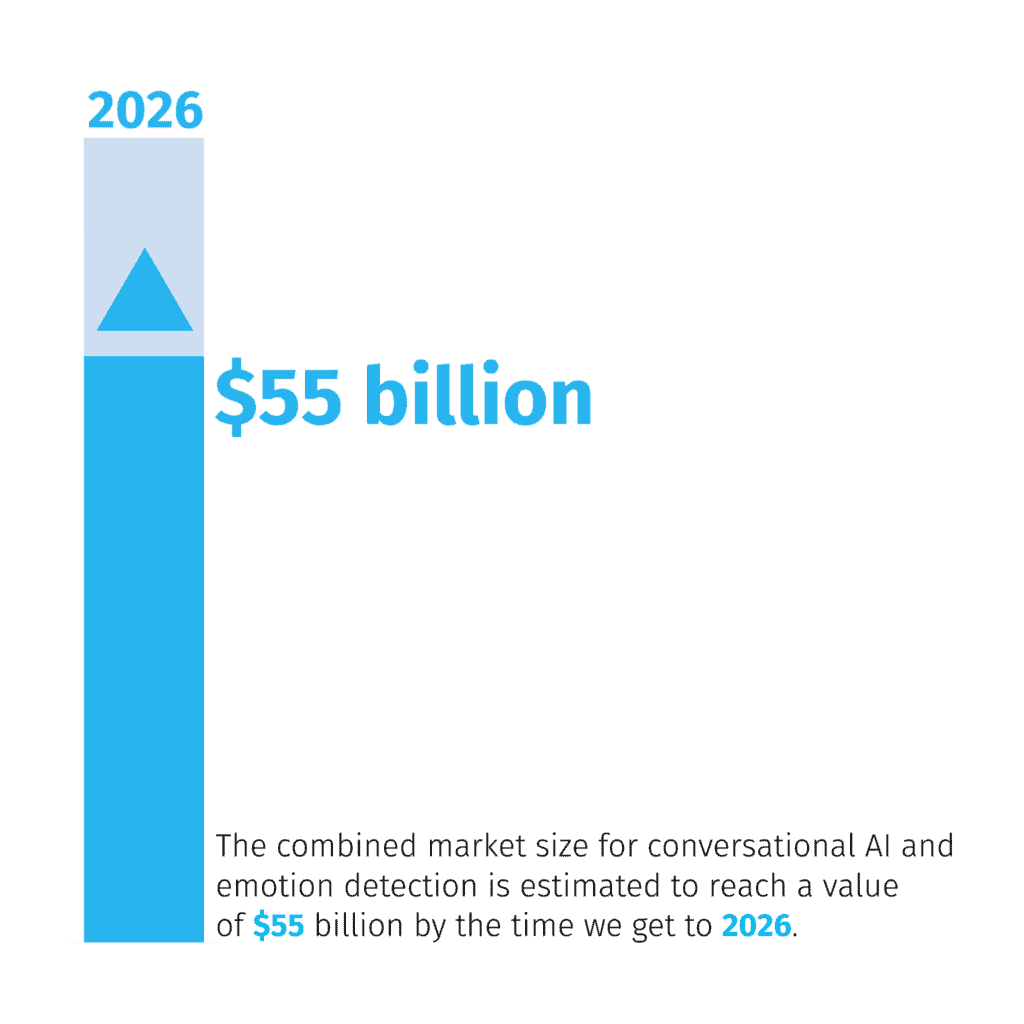- What exactly is emotional intelligence?
- What are the differences between people with high and low EQ?
- Why is emotional intelligence important in the workplace?
- Can you improve EQ through practice and training?
- Can AI help us become more emotionally intelligent?
- Interesting facts and figures about emotional intelligence
There have been some interesting developments in the workplace recently. With the increasing digitisation and machines doing more and more of the work, we also start realising how important human interaction is, and that emotions and human connections can’t be digitised or dismissed, no matter how smart and human-like some machines have become in recent years. Companies are exploring various solutions, such as emotion AI, to help increase the emotional intelligence in their employees. And as these technologies continue to improve, they will start playing an increasingly critical role in communication, productivity, and success at the workplace.
What exactly is emotional intelligence?
Emotional intelligence (EQ – emotional quotient) falls under the umbrella of social intelligence and refers to the ability to recognise, understand, manage, and deal with emotions – our own as well as others’ – and to use this emotional understanding to determine our actions, such as how we communicate with others, and the way we solve problems and make decisions. Research suggests that emotionally intelligent people have more rewarding relationships, perform better in various (work) environments, and are better able to achieve their goals.
In fact, in terms of predicting someone’s potential for performance at work, emotional intelligence is increasingly regarded as more important than IQ. According to Dr Travis Bradberry and Dr Jean Greaves, authors of the bestseller ‘Emotional Intelligence 2.0’, EQ is made up of self-awareness, personal motivation, empathy, altruism, and social skills like listening and persuasion. A high EQ is also associated with improved overall wellbeing and a higher quality of life.
What are the differences between people with high and low EQ?
People with high and low EQ can easily be distinguished. While the lists below are generalisations, they are still helpful as a guideline. Please note, also, that EQ – or a set of learned practical emotional skills – can also be developed during our lives.
People with high EQ
- Have strong awareness of their feelings and those of others
- Are able to read non-verbal communication
- Make better decisions and solve problems more effectively
- Often stay calm under pressure
- Are intrinsically motivated
- Encourage themselves and others with positive thoughts
- Are better able to resolve conflicts
- Are empathetic and understanding
- Listen, reflect, and respond to constructive criticism
- Are good team players
- Have great listening skills
- Are often top performers
People with low EQ
- Are oblivious to their own feelings and those of others
- Have less empathy for others
- Often behave insensitively
- Can be uncomfortable to be around
- Avoid taking responsibility for mistakes
- Are motivated by power, wealth, status, fame, or approval
- Have passive or aggressive communication styles
- Are unaware of the impact of their words
- Are often involved in conflicts
- Lack integrity
- Often don’t work well in a team
- Have trouble persuading others
- Are poor listeners, interrupt, and invalidate
- Are not good at stress management
- Are overly critical of others or dismiss others’ opinions
- Tend to dominate conversations and shift focus to themselves
- Often underperform

Why is emotional intelligence important in the workplace?
Up until recently, people with a high IQ were generally seen as highly employable. More and more organisations are, however, realising that being successful at a job requires quite a bit more than a high IQ. Of course, being smart is still a very good reason to hire a candidate, but it’s becoming increasingly important to look at how well someone is able to communicate with others, and whether he or she can easily get along with team members, or is empathetic. In fact, almost 75% of respondents of a study in which hiring managers were surveyed say they think employee EQ is more important than IQ.
Emotional intelligence is increasingly regarded as a critical skill that can enhance workplace relationships, make management more effective, and lead to more efficient problem solving. Someone’s level of emotional intelligence determines how well they interact with their colleagues and how they perform at work, with higher levels being linked to more job satisfaction, an improved ability to manage conflict, and better interpersonal communication skills. According to a study by researchers from Kyoto University, a person’s level of emotional intelligence also determines how well he or she is able to cope with stress. The study shows that those with high levels of emotional intelligence are able to deal with stress at work more easily, while people who struggle to understand their own emotions are more at risk of feeling overwhelmed by stress, which can impact their performance at work.
And according to an analysis by researchers at University of New England, emotional intelligence can affect job performance across all occupations. In fact, the study found that higher levels of emotional intelligence are also associated with leadership potential, as people with high levels of emotional intelligence perform well in leadership roles and are better at managing teams. Some recruitment managers specifically look for emotional intelligence in job candidates.

One important reason why emotional intelligence is getting more focus and priority than it used to is the fact that the workplace has changed significantly over the years. We work more and more in teams, and because we’re living in fast-changing digital times, we need to be more adaptable – something that comes easier to people with higher EQs. Because people with higher emotional intelligence recognise that change is inevitable, they are more flexible and open to change, new ideas, and exploring innovative solutions. Emotionally intelligent people also tend to be more self-driven and self-disciplined, which also makes them more proactive in terms of taking initiative and inspiring others to improve team performance. As people with higher EQs can recognise others’ needs and concerns, they tend to naturally create a supportive, thriving and positive work environment that attracts new talent and significantly reduces employee turnover. Their emotional intelligence also strengthens employee engagement and customer satisfaction and retention, and helps form strong collaborations and partnerships.
Can you improve EQ through practice and training?
While emotional skills may come naturally to some people and not so much to others, the good news is that EI can, over time, be improved with practice and training, self reflection, and consistent feedback from coaches or mentors. This is particularly useful in the workplace, where interpersonal (work) relationships rely on healthy communication, mutual understanding, and collaboration. According to some studies, emotional competencies can be trained and ultimately even show lasting improvements, leading to lower stress levels, better work relationships, and improved wellbeing. There are various steps people can take to improve their EQ.
Becoming more self aware is all about recognising your emotions and how they impact your decisions or your interactions with others. It means that you will need to take note when you experience emotions like annoyance, impatience, or anger, and realise that they do not need to or shouldn’t influence important decisions. Another step is to learn to regulate or manage your emotions so that you can choose appropriate ways to express them. Fine tuning your social skills and learning to communicate effectively and empathetically is another important step. Try to really pay attention when others speak, and also focus on nonverbal communication, as body language can convey important information. Ask questions and give feedback. Also, try to see things from other people’s perspective and see if you can understand how they might feel – and then, respond accordingly. Another important aspect of emotional intelligence is intrinsic motivation. Try to be committed, positive, and enthusiastic about what you do, and let yourself be motivated by your accomplishments or helping others progress, rather than money, power, or approval. In doing so, you will also inspire others.

Can artificial intelligence help us become more emotionally intelligent?
As we now know, EQ is just as important as IQ, and investing in emotional intelligence – whether it’s time, energy, or financial resources – has many benefits. The combination of linguistics, psychology, natural language processing, computer vision, and emotion detection technology has led to significantly improved AI algorithms in recent years. These have become increasingly adept at observing and analysing the ways in which verbal and non-verbal aspects of communication, such as our facial expressions, tone of voice, and body language, impact how we interact with one another. Scientists have trained AI on human conversations – using written communication, voice recordings, and video footage – to teach the technology to spot patterns indicative of effective communication. This is valuable because AI that is able to measure emotional intelligence can help people improve many aspects of their communication skills. In fact, the combined market size for conversational AI and emotion detection is estimated to reach a value of $55 billion by the time we get to 2026.
By providing insights, AI can help improve one’s self-awareness, manage one’s emotions, and even read, analyse, and match other peoples’ emotional states easier. Sales data analysis firm Gong, whose clients include Slack, Accenture, LinkedIn, PayPal, and many others, makes use of neuro linguistic programming (NLP) and machine learning (ML) to analyse interactions between customer service employees and clients. The data harvested from customer emails and video conferencing tools like Zoom is fed into a conversational intelligence system to analyse and understand customers’ emotional responses and personality profile. The insights generated are then used by a training simulator to help support agents adopt more empathetic and persuasive language in order to improve communication and client engagement.
Indeed, AI can make us more self aware and help us manage our emotions better, and in doing so, also help improve our emotional intelligence. This can help us become better, more empathetic communicators and work more efficiently and productively. Although emotion AI technology is still in its infancy, as the technology increases in scale and sophistication, it’s becoming more (emotionally) intelligent every day.
Another company that’s making great strides in emotion AI and Human Perception AI is the emotion recognition software startup Affectiva, founded by computer scientist Rana el Kaliouby. El Kaliouby, who previously worked as a researcher at MIT Media Lab, is of the opinion that AI requires EQ as well as IQ, as it needs to be able to understand and interact with us the way humans do, in order to enable us to improve not only how people interact with machines, but also how people interact with other people. The software developed by Affectiva is based on real-world data, computer vision, deep learning, optical sensing technology, and speech science, which enables it to understand people’s emotional and cognitive states. The optical sensors, such as a webcam or smartphone camera, are used to identify human faces in real time, while computer vision technology is used to map the shape of the face, as well as its movements and expressions. The company has analysed more than 8 million faces in almost 90 countries all over the world to train its algorithms to identify emotions such as joy, fear, and anger. Other ways to gain insight into human emotions include gestures as well as the features of someone’s voice.
“There’s definitely the potential for AI to improve the way we interact with one another and re-inject emotions into our digital interactions”
And as AI interacts with humans in increasingly varied settings and situations, it can also be trained to understand more than just emotions – such as interactions, behaviours, and complex cognitive states. This will eventually not only transform how we interact with technology and our devices, but also with each other.
El Kaliouby says: “There’s definitely the potential for AI to improve the way we interact with one another and re-inject emotions into our digital interactions. When we interact with people online, we are missing all of the nonverbal cues that come with a face-to-face conversation. My hope is that, by incorporating the emotional element of communication into digital interaction, we can start to take steps toward more empathetic, humane and authentic online communication.”
“Some 74% of executives and 58% of non-supervisory employees of some of the world’s leading companies believe that emotional intelligence will become an increasingly critical skill for business competitiveness.”
Interesting facts and figures about emotional intelligence
According to research by Capgemini, some 74 per cent of executives and 58 per cent of non-supervisory employees of some of the world’s leading companies in finance, healthcare, insurance, and other sectors, believe that emotional intelligence will become an increasingly critical skill for business competitiveness in the digital age. Here are some more interesting facts and figures about emotional intelligence at work.
In closing
The rise in artificial intelligence and growing digitisation makes emotional intelligence an increasingly valuable human quality. Emotions play an important role in intelligent behaviour and significantly impact decision-making processes. It’s important for companies to explore various solutions, such as AI, to help make their employees more self-aware, empathic and emotionally intelligent, which will enhance communication skills and improve productivity and efficiency. Although technologies like emotion AI are still far from perfect, as they improve in sophistication, they will start playing an increasingly critical role in the productivity and success of people and the companies they work for.
Share via:


